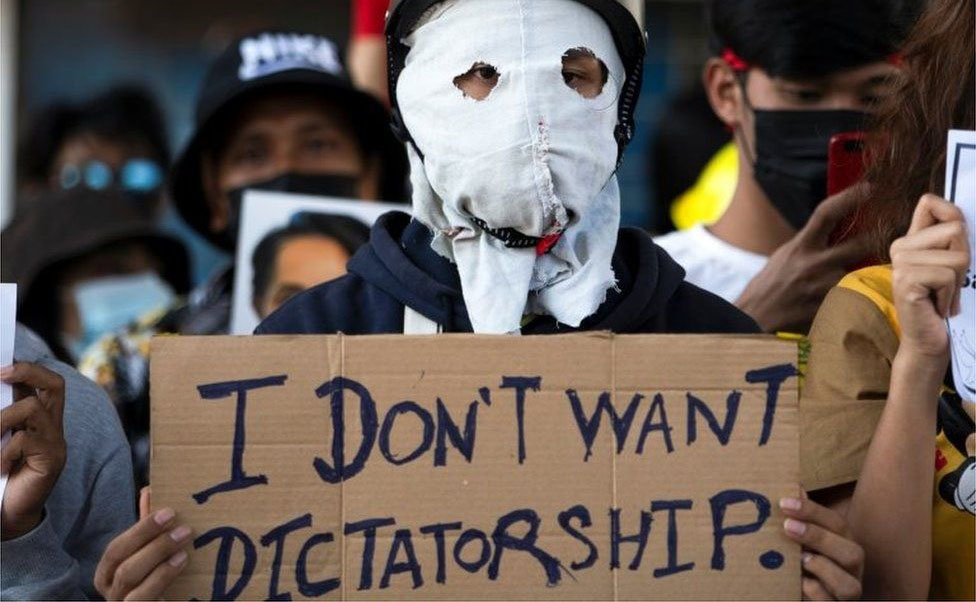On February 1, Myanmar’s military, the Tatmadaw, detained hundreds of civilian government officials and seized control of the government, declaring a state of emergency. The leader of the National League for Democracy (NLD) and a Nobel Peace Prize laureate Aung San Suu Kyi was among the civilian leaders detained on an unfounded charge of violating import and export laws. The military government, led by Senior General Min Aung Hlaing, will remain in power for the duration of the year-long state of emergency in accordance with Article 417 of the Myanmar Constitution.
Myanmar is home to many religious and ethnic minorities. The military takeover not only threatens the livelihood of persecuted minorities throughout the country, but also the country’s transition from a military dictatorship to a functioning democracy. The international community needs to unite in their response to the coup and condemn such a grave abuse of power.

In Myanmar, tens of thousands of citizens crowd the streets, protesting the military-led coup. Photo courtesy of BBC News
Although Myanmar has alternated between being a military and civilian government since 1949, the Tatmadaw has always maintained significant political power, suppressing any dissidents and plunging Myanmar into poverty.
Many human rights advocates have voiced their concern for the religious and ethnic minorities persecuted in Myanmar, such as the Rohingya Muslims. Daniel Sullivan, an advocate for human rights at Refugees International, told Vox, “The military is responsible for genocide against the Rohingya and other severe human rights abuses against other ethnic minorities, including the Rakhine, Kachin, [and] Shan.”
Ms. Suu Kyi’s victory in the 2015 democratic elections led to the formation of a civilian government, signifying a definitive step towards democracy in Myanmar. What’s more, Ms. Suu Kyi’s leadership is a safeguard against human rights violations and religious and ethnic persecution.
Although the NLD was triumphant again in the 2020 elections, their campaign tactics resulted in an uproar from the military. Ms. Suu Kyi’s campaign largely involved restricting the military’s role in government, and her party’s victory catalyzed a series of restrictive reforms. The Tatmadaw viewed Ms. Suu Kyi and the NLD’s leadership as a direct threat to their authority and claimed the election results were fraudulent without any evidence.
Tensions escalated when the military launched a coup, detaining civilian leaders, shutting off the internet in major cities, and cutting off all flights.
International response to the coup has varied. The Biden administration, along with the European Union and the United Nations, condemned the actions of the Tatmadaw and called on military leaders to immediately release all detainees within hours of the event. China, however, did not take such a strong stance — the nation has long held a policy of noninterference regarding other countries’ domestic affairs.
The U.S.’s response was not surprising. From 1962 to 2011, the United States, along with other nations, imposed sanctions on Myanmar in response to human rights violations and to promote pro-democratic reforms. The Obama administration lifted many sanctions near the end of 2016 because of Myanmar’s evident progress toward democracy as a result of Ms. Suu Kyi’s leadership.
Now, the Biden administration is considering reestablishing sanctions on Myanmar in response to the coup. National Security Adviser Jake Sullivan said, “We are reviewing the possibility of a new executive order, and we are also looking at specific targeted sanctions, both on individuals and on entities controlled by the military that enrich the military.”
The coup in Myanmar is a test of President Joe Biden’s commitment to democracy. Biden has pledged to promote human rights internationally. The coup in Myanmar is a threat to its citizens’ — in particular minorities’ — well-being and the country’s political stability.
There are many things the U.S. could do to help, starting with convincing Asian countries, especially China, to condemn the actions of the Tatmadaw. U.S. trade with Myanmar amounts to approximately $1.4 billion, which pales in comparison to China’s trade with Myanmar, which was $17 billion in 2019. Ultimately, the U.S. needs to pressure China to use its heavy economic sway in Myanmar to dissolve the Tatmadaw and restore peace.




